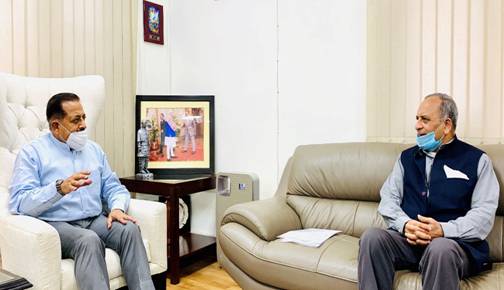RTI disposal rate had remained unaffected by the pandemic and was even higher than the usual: Dr. Jitendra Singh
New Delhi: Hitting back at the opposition for unsubstantiated observations made by certain senior Congress and other leaders alleging that COVID pandemic had left the various Commissions in Government of India including the Central Information Commission inactive, Union Minister of State (Independent Charge) Development of North Eastern Region (DoNER), MoS PMO, Personnel, Public Grievances, Pensions, Atomic Energy and Space, Dr Jitendra Singh rebutted with statistical figures to state that, quite contrary to this, the RTI disposal rate had remained unaffected by the pandemic and during certain given intervals of time, the disposal rate was even higher than the usual.
After a review of the functioning of Central Information Commission (CIC) with Chief Information Commissioner of India BimalJulka, Dr Jitendra Singh said, the functioning of the Commission had not been interrupted even for a single day during the entire course of the pandemic. In fact, he said, it goes to the credit of the Commission and its functionaries that inthe midst of the pandemic on 15th May this year, the Central Information Commission started entertaining, hearing and disposing of RTIs from the newly created Union Territory of Jammu & Kashmir, through virtual means.
Citing figures compiled by the Commission, Dr Jitendra Singh said, e-office was extended to the home computers of officers and intensive use of technological tools was implemented for disposal of cases. While, the number of cases disposed of every month during the pandemic remained comparable to the corresponding month of the last year, one glaring example is that of the month of June 2020 when the number of RTI cases disposed of by Central Information Commission was 1785 compared to 1297 cases in the month of June 2019, which in other words indicates that the disposal rate was in fact significantly higher during this period, despite the constraints of COVID pandemic, he said.
Shri Julka informed Dr Jitendra Singh that the various steps taken to facilitate the CIC hearing during the lockdown and partial lockdown included video conferencing, audio conferencing, facilitation of return submission, uploading of the contact details of Deputy Registrars on the website, issue of notices by e-post wherever required, online registration and scrutiny of fresh cases on the same day etc.
Not only this, Chief Information Commissioner informed the Minister that the Commission had also effectively continued its interactive and outreach activities. These, he said, included video conference with civil society representatives and video conferencing with members of National Federation of Information Commissions in India (NFICI).

